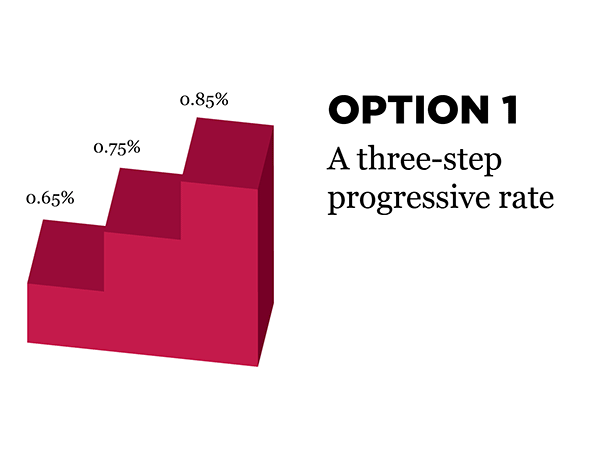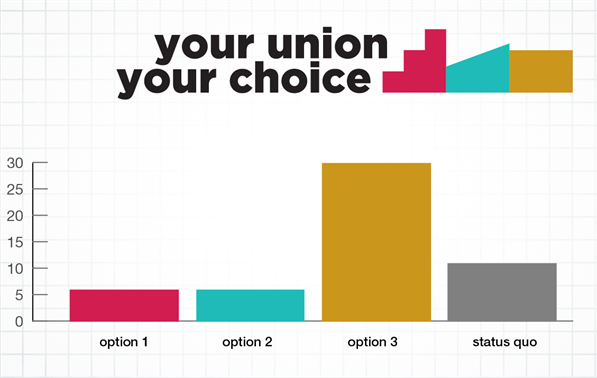CAPE members met on February 25 to discuss some key steps in our evolution. The February 25 special general meeting was, in part, meant to kick-off a series of discussions on the proposed options for a progressive dues structure. Over the coming months, CAPE intends to hold similar discussions and debates in workplaces across the country in the lead-up to a June vote of the membership.
The resolution to research and present options was originally presented by members of the Young Members Advisory Committee; 59% voted in favour of the resolution when it was presented during our last annual general meeting.
“I would love to talk to my new members and say ‘hey, CAPE supports you as a new member and we believe that treating people equitably is important,” said Maggie Simpson, co-chair of the Young Members Advisory Committee.
CAPE members currently pay a $48 monthly flat fee as union dues. This flat-fee means that those who earn less end up paying more than their higher-earning counterparts when our dues structure is examine as a proportion of income. An EC-01 can pay as much as 1.19% of their income in dues, whereas an EC-08 at the top of the pay scale can pay as little as 0.47%.
The three options being proposed. Find out more by clicking here.
After a short presentation on the three options, members were invited to ask questions and debate the options. While there was a clear diversity of opinions and concerns, many members applauded the union’s effort to increase fairness in its daily business.
“As an executive member for my local, it’s going to be hard to defend this,” said one member. “What is an EC-07 going to get out of this and why?”
“I’m afraid this will be divisive.”
This was a concern raised by a few members; that by adopting a progressive dues structure, we’re making some members pay more for the same service. While it’s true that CAPE has a duty to provide the same high-quality representation service to all its members, our work at the bargaining table does yield greater dividends for members earning higher salaries. When CAPE negotiates a 1.5% salary increase, for example, that translates to an extra $750 a year for a member earning $50,000/year; someone earning $100,000/year, by comparison, gets an extra $1,500 in their pocket.
“I strongly support any of these options,” said another member who identified herself as an EC-06. “I work with a lot of people who are looking to walk the talk. If we say we’re supporting principles of increased equity and fairness, I think this is it: proportional dues structure.”
Another member was curious whether this is common practice in other unions. Progressive dues structures exist in many other unions: the Public Service Alliance of Canada, the Association of Justice Counsel, and the Professional Association of Foreign Service Officers, to name but a few. And this isn’t strictly a public-sector labour union issue; unions who operate primarily in the private sector also have progressive dues structures – Unifor, charges 1.35% of gross monthly income; United Steel Workers charges 1.45%, plus 2 cents per hour worked.
The meeting also offered us an opportunity to debunk the idea that this change in dues structure was a way for CAPE to increase its overall revenue. In fact, all options aim to be as revenue-neutral as possible; some may yield a small increase or decrease of the overall CAPE revenue, depending on the option selected. As we are committed to transparency, that information is easily accessible by reviewing this spreadsheet. It’s also true that, as salaries increase, CAPE would see its revenue increase accordingly. So, there is a clear benefit for our association; our operations would become more sustainable, since our revenue would slowly increase over time alongside inflation.
After debating the options for a solid hour, members were invited to take part in a straw poll; option 3 was the clear winner.
More discussions and straw polls in workplaces will follow over the coming months. The cumulative result of all these discussions and polls will help the duly-elected members of the national executive committee arrive at one option that will be submitted for a final vote in June.
At that time, all members will be invited to vote to either adopt the proposed progressive dues structure or to stick with the status quo.
“I think it’s important for us to support these types of initiatives,” said Simpson. “I want to be part of a union that wants to be fair and support our members. I think this issue can be something that makes a tangible and positive impact in the lives of our members.”
To find out more about the options and the process, please click here.





